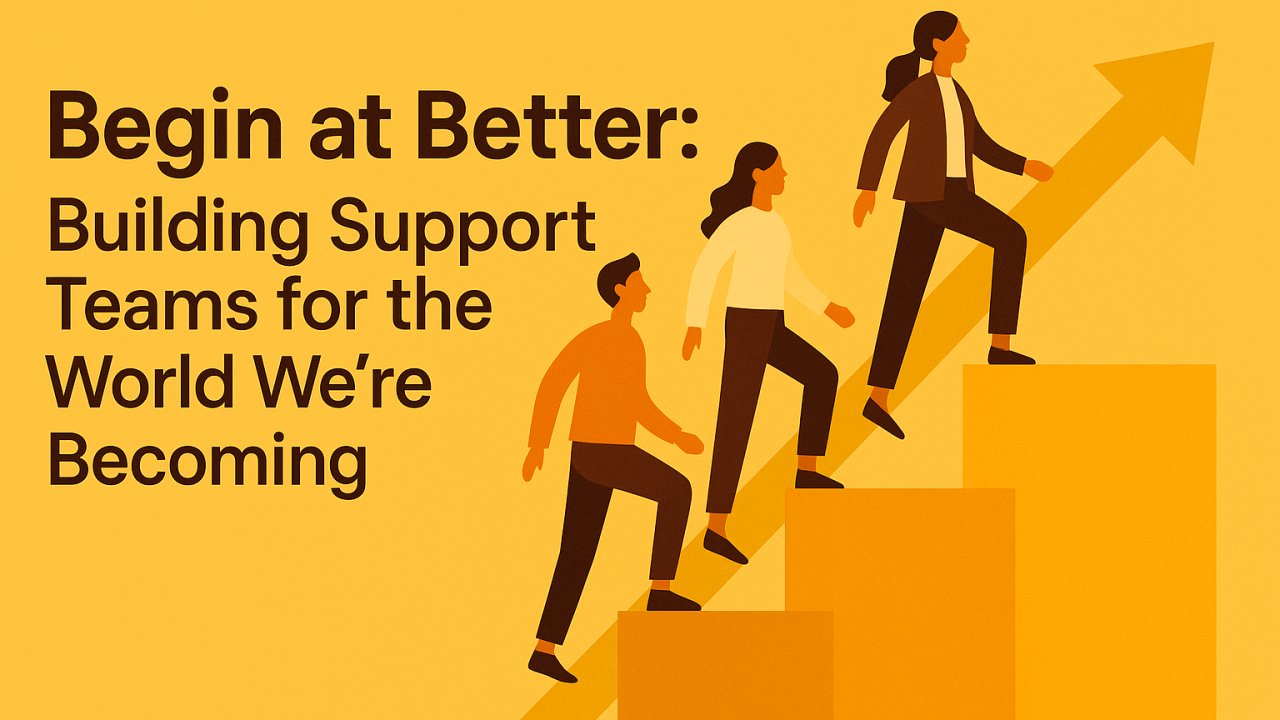Begin at Better: Building Support Teams for the World We're Becoming

A few years back, I sat in a strategy session where every department got a seat at the digital transformation table—except Support.
Marketing was getting BI-powered insights. Product had a roadmap full of predictive analytics. Sales had automation out the wazoo. And Support? We got looped in at the end, handed a chatbot prototype, and told, “Let us know if this helps.”
That moment stuck with me—not because it was unique, but because it was so typical.
Support teams are too often seen as cost centers, left to retroactively adopt tools designed for someone else’s workflows. We’re handed shiny new AI features and told to "drive adoption," even when the underlying processes are broken or stuck in the past.
But as someone who’s worked in both enterprise software and entrepreneurial ventures, I can tell you: that’s not transformation. That’s patchwork. And it’s time for a different approach.
Start with better—not just what's broken
Real transformation doesn’t start with tools. It starts with people and processes.
AI, copilots, agentic workflows—all of it can absolutely elevate support. But if you’re layering these tools onto outdated structures, siloed teams, and burned-out agents, you’re just speeding up dysfunction.
This is the mistake I see most often: trying to “fix” what’s broken by automating around it. Instead, we should be asking: What would this look like if we started fresh?
Or as I like to say, empezar con lo bueno. Start with what’s already good, or what could be. Build from there.
Support roles are evolving. Our hiring and upskilling strategies should, too.
If you’re still hiring support reps based solely on their ability to handle tickets quickly, you’re missing the bigger picture.
The nature of support work is shifting—from repetitive problem-solving to creative decision-making, from reactive responses to proactive care. And that means our teams need new kinds of skills: system thinking, empathy, data literacy, comfort with ambiguity.
Yes, hire for the future—but also give your existing team a path forward. I’ve seen frontline agents become workflow designers. I’ve worked with knowledge managers who evolved into AI trainers. These are people who already know the customer, the systems, the pain points. Give them the tools and trust, and they’ll lead the transformation with you.
Somos humanos antes que técnicos. We’re human before we’re technical. That should be our compass.
Agentic workflows are changing the game—but humans still drive the playbook
Agentic workflows—where AI takes action on your behalf—are incredibly powerful. They can triage tickets, surface insights, even execute fixes across systems.
But they also shift how decisions are made. And when decisions shift, trust becomes the key.
Are your workflows enhancing human judgment, or replacing it? Are you designing with your agents in mind, or designing them out of the loop?
We have to involve support teams in shaping these systems—not just in using them. It’s not about replacing people with tools. It’s about creating new kinds of roles, new kinds of collaboration, and ultimately, a new kind of customer experience.
Don't build by default. Build with intent.
The biggest threat to meaningful transformation isn’t bad technology—it’s inertia. It’s the tendency to keep doing what we’ve always done, just slightly faster.
Now is the time to challenge old assumptions.
- 👉 What should support look like in your company today?
- 👉 What metrics actually reflect customer trust, not just efficiency?
- 👉 Where are we asking people to work around problems instead of solving them?
These are design questions—not implementation questions. As support leaders, we need to stop inheriting broken systems and start building better ones.
Support is the front line of trust
I’ve said this in every role I’ve had: Support is the moment of truth in a customer relationship. It’s where loyalty is earned, where promises are tested, where the human part of your business shows up.
That’s not going away in an AI-driven world. If anything, it’s becoming more important.
So let’s stop treating support like an afterthought. Let’s build teams designed for the world we’re becoming—diverse in skills, grounded in empathy, empowered by tools that truly serve their work.
Hire future-ready people. Invest in your existing ones. Build intentional workflows. Design for trust.
Because at the end of the day, transformation isn’t something we do to our teams—it’s something we build with them.
🔁 Share this if you're rethinking how your support team shows up in the AI era.
💬 I'd love to hear how you’re building future-ready roles or designing around new workflows—drop a comment below.

